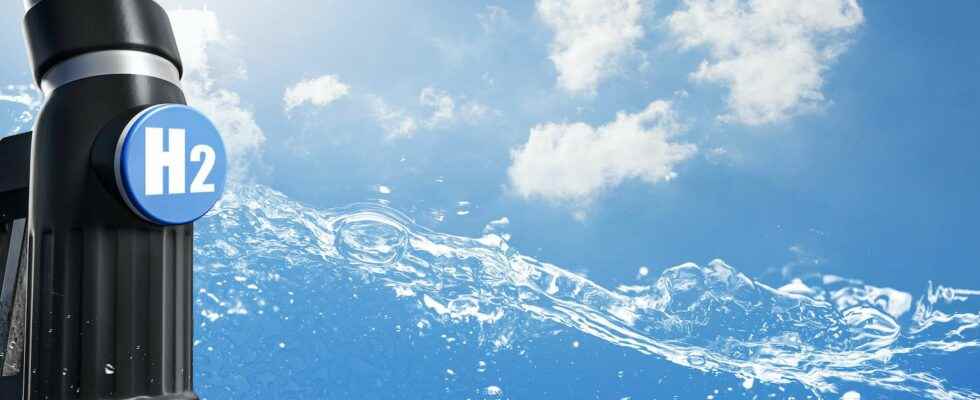You will also be interested
[EN VIDÉO] Hydrogen car: a hybrid service station tested in Switzerland Like other nations, Switzerland is preparing for the massive arrival of electric and hydrogen vehicles for which it will be necessary to develop an energy distribution network. It is in this perspective that the École polytechnique fédérale de Lausanne has undertaken to test a service station concept capable of recharging cars with electricity or hydrogen produced on site and without carbon dioxide emissions.
At the pump, prices are skyrocketing. In dealerships, buyers of cars new ones are becoming increasingly rare. Registrations have been falling for more than a year. Some 170,000 in June 2022 compared to nearly 200,000 in June 2021. This is almost 15% less. Only the electric cars pull out of the game.
The registrations of hydrogen cars, as for them, still remain confidential in France. Will the price of refueling boost sales? “Today, we are able to offer a full tank at 75 euros”, assures us Camille-Léa Passerin, the development director of HYSETCO. The French start-up is neither more nor less than one of the European mobility leaders hydrogen. A full tank at 75 euros would almost make you dream. But, in fact, a full tank of hydrogen, what does that correspond to? “A taxi consumes about 1.2 kilogram of hydrogen per 100 kilometres. With a tank of 5 to 6 kilos, this gives it a real range of around 500 kilometres”says Camille-Léa Passerin.
But why is the development director of HYSETCO talking to us about taxis? Because that’s the example she knows best. The start-up, in fact, has developed a kind of turnkey service for taxi drivers. Hydrogen distribution stations on the one hand and a fleet of vehicles that it maintains and rents to professional customers on the other. “Hydrogen responds particularly well to intensive needs. Those of professionals who are looking for a good autonomy and who cannot afford to wait half an hour for their battery to charge. » The experience at the hydrogen pump is indeed much the same as that at the gas pump. “Refueling takes just 5 minutes. »
Costs still to come down
To really convince, however, the network of charging stations must also be sufficient. “The first taxi drivers to choose hydrogen did so because they found a station on their way”, explains Camille-Léa Passerin. Today, HYSETCO operates four stations in the Paris region. Approximately 7 tons of hydrogen delivered each month to some 200 taxis. The ambition: to expand the network to twelve stations by 2024. Twelve stations and several thousand vehicles.
“For now, the range is more than limited”, says HYSETCO’s Director of Development. Only two vehicles are available for sale, a sedan (Toyota Mirai) and a SUV (Hyundai Nexo). “But others are positioning themselves in the hydrogen utility niche, in particular. Because, here too, hydrogen has a real role to play. Compared to electric, it not only allows you to keep a good autonomy, but also not to lose payload. » Because a hydrogen tank, even full, does not weigh as much as the battery needed for an electric vehicle.
For the individual however, Camille-Léa Passerin agrees, “The battery-powered electric car remains an alternative today”zero emissions“more accessible than hydrogen”. It will remain so at least as long as the supply of vehicles and the network of hydrogen charging stations will not be sufficient. And as long as the still too limited industrialization of the sector does not make it possible to lower the costs of acquiring a hydrogen vehicle. “For now, the sector still needs to be subsidized. But with the regulations which, more and more, require finding alternatives to heat enginesit will become industrialized and costs will fallexplains the director of development of HYSETCO. Already, the Toyota Mirai 2 costs almost 15% less than the Toyota Mirai 1”.
The price of hydrogen at the pump is, meanwhile, quite… artificial. “Because we are subsidized. Because we cannot yet sell the hydrogen that we would like to distribute [ndlr : un hydrogène plus vert dont il sera question dans un prochain sujet]recognizes Camille-Léa Passerin. We offer a full tank at 75 euros, which corresponds to around 15 euros per kilogram of hydrogen (€/kg). But the objective set by the Agency for the environment and the control ofenergy (Ademe) is around €9/kg”. Or finally, a full tank that could be done in the long term, at only… 45 euros!
Interested in what you just read?
